Best DJ mixers: Top choices for club, home and battle DJs
Our experts round-up the best DJ mixers for all budgets from Rane, Allen & Heath, Pioneer and more

A mixer is one of the most vital elements of any DJ setup. Mixers are, quite literally, the centre-piece of any DJ booth – the thing that allows tracks to be mixed and manipulated. Essentially, it’s the mixer that separates a DJ setup from a home music system. In this guide, we’re going to help you find the best DJ mixers at a variety of price points.
Since they’re so important, it’s worth really considering what you need and what you can get for your budget. Given the flexibility of modern DJ setups, mixers can come in a variety of forms. They might be virtual tools, built into the UI of your DJ software. Alternatively, you might use a ‘real’ mixer built-in as an element of a DJ controller – acting as both a software control surface and audio interface.
What we’re covering here, however, are DJ mixers in the traditional sense of the term – hardware devices with inputs, outputs and a variety of sound shaping controls, which are designed to allow users to combine audio coming from multiple ‘players’, such as turntables or CDJs. Below, we’ll be covering everything from beginner DJ equipment to high-end tools and the best mixers for battle DJs.
Head to the bottom of the page for more DJ mixer buying advice.
Best DJ mixers: Our top picks
Crowning a definitive ‘best DJ mixer’ is a tricky job. The three DJ mixers that top our list – from Allen & Heath, Pioneer DJ and Playdifferently – are all hard to fault. However, each is expensive and boasts features that the bulk of DJs out there simply won’t need. If you are in the market for a top-end, large format mixer though, Allen & Heath’s updated Xone:96 is truly classy, but also a touch more affordable than its rivals.
On the other hand, Pioneer DJ’s Nexus range verges on being ‘industry standard’, particularly in European clubs. You can’t go far wrong with the flagship DJM-900NXS2, but the DJM-250MK2 also offers an entry point into the range priced at an accessible point for beginners and home DJs.
For something a little different, Rane’s MP2015 rotary mixer is pure class. This design of DJ gear won’t suit everyone – it’s best suited to classic house and techno heads – but many pro DJs swear by rotaries, and for good reason.
Finally, if you’re on the lookout for a budget DJ mixer, Numark’s M6 USB is worth a look. It’s a little dated and is lacking on the effects front, but for a rugged, four-channel workhorse it remains a bit of a bargain.
Best DJ mixers: Product guide
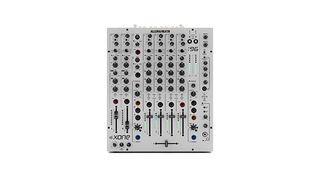
1. Allen & Heath Xone:96
Our expert review:
Specifications
Reasons to buy
Reasons to avoid
Released in the early-noughties, A&H’s Xone:92 mixer is an all-time classic, beloved by many pro house and techno DJs. After years without an update, the company finally unveiled this follow-up in 2018. Fortunately, the design here refines the design of its predecessor, rather than drastically overhauling anything.
Like the original, this is built like a tank and offers plenty of flexibility, with great EQs and filters. Where the 96 updates the design is in the addition of an onboard audio interface, along with expanded send/return capabilities and extra control over the booth output.
It’s certainly not a cheap option, but this is a real top-of-the-line DJ mixer that is likely to hold up well to decades of regular use.
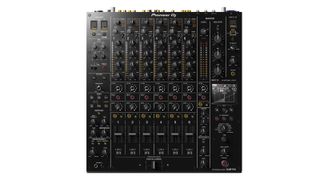
2. Pioneer DJ DJM-V10
Our expert review:
Specifications
Reasons to buy
Reasons to avoid
The past few years have given rise to a new wave of top-spec, large format mixers – DJ hubs with 6+ channels and enough functionality to please even the most creative user. Despite their dominance in much of the DJ market, Pioneer DJ were a little late to this party, releasing the DJM-V10 in response to the success of the Xone:96 and original Model 1 from Playdifferently.
Like those mixers, the V10 is a truly top-end device that puts emphasis on audio quality and setup flexibility. Feature highlights include Isolator EQs, per-channel compression and touchscreen effects.
There’s not a lot of negative points we can make about Pioneer’s top-end mixer, other than the fact that it’s very expensive – more so than the Xone:96, and roughly in line with the Model 1 – and you probably don’t need it. Unless you count yourself as a veteran DJ and have outgrown the functionality of other mixers in the past, it’s almost certain that a cheaper option on this best DJ mixer list will be able to fulfil your needs.
Pioneer has also released an LF version, which stands for ‘long fader’. The ditches the crossfader in favour of lengthened channel faders ideal for long, slow blends.
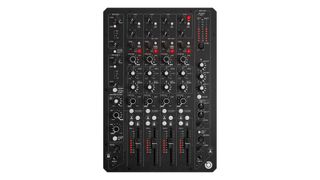
3. Playdifferently Model 1.4
Our expert review:
Specifications
Reasons to buy
Reasons to avoid
Minimal icon Richie Hawtin has had his fingers in a lot of music technology pies over the years. His Playdifferently DJ brand is one of his more recent ventures, founded alongside former Allen & heath designer Andy Rigby-Jones in 2014.
The company’s first product, the Model 1 mixer, was a top-end, all-singing, all-dancing 6-channel mixer aimed at creative and adventurous DJs. The Model 1 is incredibly well-spec’d and undeniably impressive, our pick, however, is its more recent, trimmed down counterpart, Model 1.4.
Design-wise, the 1.4 shares a lot of features with the flagship Model 1. This includes high-build quality, precision EQs, ‘contour’ filters and multiple send/return channels. The main difference is that the mixer has been cut down to 4-channels, which gives it a smaller, more tour-friendly form factor and brings it down to a – slightly – more affordable price point.
As the brand name suggests, these Playdifferently mixers do have some slightly unusual features that mean they won’t be suited to all types of DJ. The most noticeable is the lack of a crossfader. The channel strips here are ideal for blending loops or layering DJ tools in a hybrid live-DJ setup, but not so much designed for cutting between tracks in a traditional DJ sense. There’s no mic connectivity either, and the EQ system breaks away from the usual per-channel setup common to most mixers. As a result, these mixers are best suited to genres such as deep house, minimal or leftfield techno.
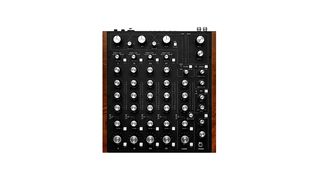
4. Rane MP2015
Our expert review:
Specifications
Reasons to buy
Reasons to avoid
Rotary mixers aren’t for everyone, but many DJs swear by them. The use of rotaries rather than faders to blend tracks encourages a certain style of, generally slower, mixing. Because of this, tools like these tend to be beloved by deeper house and techno DJs, and certainly aren’t the obvious choice for scratching.
Rotary mixers also tend to be synonymous with high-quality audio, and Rane’s latest certainly delivers on that front. Isolators, adjustable EQs and filters give you a ton of control over the frequency of each track too, making this ideal for long, smooth mixes.
For all its retro-cool though, there are some modern touches here too, namely a built-in audio interface for use with a computer. The MP2015 is Serato Scratch compatible too.
This design of mixer might not be for everyone, but for those seeking quality and class, this is one of the best DJ mixers around.
Hands-on with the Rane MP2015 DJ mixer
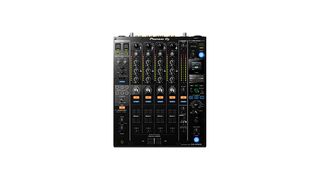
5. Pioneer DJ DJM-900NXS2
Our expert review:
Specifications
Reasons to buy
Reasons to avoid
Pioneer’s DJM series is probably the most common range of DJ gear you’ll see in clubs around the world. While plenty of DJs will espouse a preference for Allen & Heath or Rane mixers in the DJ booth, Pioneer’s ubiquity isn’t without reason; the brand has years of experience designing quality, pro-level DJ gear, as the flagship of the DJM range is testament to that.
The thing that impresses most about the 900NXS2 is its broad range of features. From channel EQs and filters to the dual USB ports and mic inputs, there’s not a lot of bases that aren’t covered here. There’s also an extensive range of effects, including reverbs, flangers, beat repeats and the company’s distinctive ‘Sound Color FX’, which offer a range of dynamic transition and build-up sounds. There’s a send/return too, for adding external processors via audio or USB connectors.
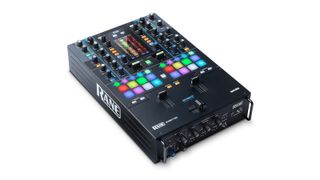
6. Rane Seventy-Two
Our expert review:
Specifications
Reasons to buy
Reasons to avoid
Rane’s two channel mixer does an excellent job of bridging the gap between traditional and digital DJ technology. It’s essentially a combined analogue mixer and controller for Serato DJ Pro, with multiple inputs for ‘real’ decks and CDJs paired with dual USB connections allowing seamless transfer for two Serato DJs.
This mixer is particularly aimed at scratch DJs, with magnetic faders and crossfaders, plus MPC-style performance pads which are ideal for sampling and cue point jumping within Serato. It also features a central touchscreen giving direct access to each Serato deck’s waveform. In all, it’s a very impressive mixer, if rather chunky and not particularly cheap.
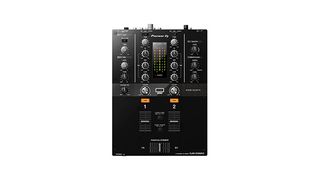
7. Pioneer DJ DJM-250MK2
Our expert review:
Specifications
Reasons to buy
Reasons to avoid
Pioneer DJ are - arguably - the biggest name in professional DJ gear these days. Their CDJs are effectively standard issue for clubs around the world, and while their mixers don’t enjoy quite the same level of ubiquity, their higher-end offers are still a common sight at major clubs and festivals. For beginner DJs, one of the major bonuses of this two channel mixer is that it offers the same look and feel of those pro machines at a more affordable price.
This is more than an entry-level tool though. One major plus point is the fact that it’s rekordbox-compatible and DVS ready, making it a great option for those who want a small ‘two turntable and a mixer’ setup, but like the idea of toying with digital DJing.
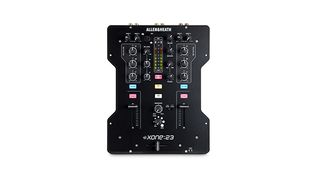
8. Allen & Heath Xone:23
Our expert review:
Specifications
Reasons to buy
Reasons to avoid
A&H’s Xone range represents some of the best DJ mixers around and are the choice of many pro and amateur DJs alike. This simple two-channel model is great as a simple and affordable entry point into that range.
Sound quality is excellent here, and the quality EQs and sweepable central filter are great tools for sculpting tracks. The addition of send/return connections to add external effects is a nice touch at this price point too.
While this is a relatively simple mixer, independent booth outputs and a front panel mic input add enough flexibility for small setups, clubs and events. In all, a rugged, well-designed mixer that offers quality at a reasonable price point.
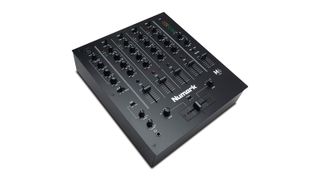
9. Numark M6 USB
Our expert review:
Specifications
Reasons to buy
Reasons to avoid
While Numark might not be as much of a leader in this realm as either Pioneer DJ or Allen & Heath, they’re still a brand with a long heritage in the DJ market. In terms of the amount of features you get for your money, you’d be hard pushed to find a better deal than the company’s M6 USB.
You get four full mixer channels here, each with three-band EQ, plus a mic input, all for a street price less than £200/$250. As the name implies too, there’s a rear panel USB port allowing connection to a computer in order to stream and record audio.
The M6 is a little dated - it’s been around since 2012 - and is lacking any form of effects or filter capabilities. But for a solid four-channel mixer at a low price this is still a great option.
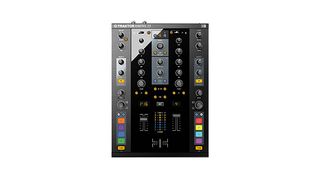
10. Native Instruments Traktor Kontrol Z2
Our expert review:
Specifications
Reasons to buy
Reasons to avoid
As its name implies, NI’s DJ mixer is very much designed with their Traktor software in mind. Like the Rane Seventy Two above, this balances analogue inputs that can be connected to hardware players with MIDI controls here largely focussed on using the sampling and Remix Deck functions within Traktor.
The Z2 is Traktor Scratch ready, so can be used to turn existing turntables or CDJs into a digital DJing setup. For those wanting to expand things on the digital side too, it can be paired with NI’s X1 and F1 controllers for additional control.
The Z2 is nearly a decade old now, and probably due an update. That said though, it still gets the job done, and for anyone tempted by the idea of Traktor but also attached to a classic ‘two decks and a mixer’ setup, this is a great option and a good price point.
Read the Native Instruments Traktor Kontrol Z2 review
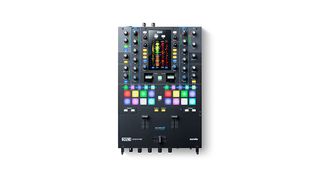
11. Reloop Elite
Our expert review:
Specifications
Reasons to buy
Reasons to avoid
Another battle mixer that balances traditional analogue channels with software control. The Elite has a lot in common with both the Rane Seventy-Two and Pioneer’s DJM S9. Again, it’s designed to play nice with Serato DJ Pro, with a bank of backlit pads to make the most of the software’s sample, cue and roll tools. It ships with the full Serato DVS expansion and control vinyl too.
It lacks the distinctive effects of Pioneer’s equivalent or the touchscreens of the Seventy-Two, but is still a very well equipped mixer at a comparatively good price.
Best DJ mixers: Buying advice

How many ins and outs do you need?
MusicRadar's got your back
The most basic form of DJ mixer will offer up two input channels that can be blended using level controls and, in most cases, a crossfader. The resulting audio will then be fed to a main output, as well as an assignable ‘cue’ DJ headphone output, which allows users to hear a track without it being mixed into the main mix. Many mixers offer more than this though; four or more input channels are common on higher-end mixers, as are mic inputs, booth outputs and effects loops.
But how many ins and outs do you actually need when choosing the best DJ mixer for you? Broadly speaking, more I/O means more flexibility and more future proofing. If you’re a beginner DJ you may find that two channels are enough for now, but you may reach a point in the future where you’d like to add a third or fourth deck in order to get more creative. Those looking to play weddings and commercial functions will likely want a mic input. DJs likely to play larger clubs, on the other hand, will likely need a booth output.
However, extra ins and outs don’t come for free, and if you’re confident you won’t want to do more than mix records from two turntables or CDJs then a simple 2-channel mixer may well do the job. This is particularly the case for scratch DJs and turntablists, who tend to prefer the ‘battle mixer’ format. These tend to stick to two channels but pile on additional performance features and puts extra emphasis on quality faders and crossfaders.
What effects do you need?
The majority of DJ mixers have at least some form of channel EQ and, in many cases, a low/high-pass filter. Higher-end mixers generally offer additional effects too, such as rhythmic delays or gates or things like phasers, reverbs or even one-shot FX. While none of these are strictly necessary to DJ with, the more tools you have at your disposal the more creative you can be. For additional customisation, an external effect loop lets DJs add pedals or desktop effects into their setup.
Consider digital compatibility
Despite electronic music being, in many ways, at the forefront of technological development, DJs tend to be a little set in their ways. As such, many tend to shun the whole realm of ‘digital’ DJing in favour of a traditional ‘two decks and a mixer’ setup.
There’s no ignoring the fact that the march of progress is heading towards the digital realm though, so having some kind of compatibility isn’t a bad idea. In the mixer market, digital compatibility ranges from USB ports allowing streaming of audio to/from a computer to full DJ controllers integration with DJ applications such as Serato, Traktor and rekordbox.
Many mixers are ‘DVS-ready’ too, meaning they’re set up to use one of the major digital vinyl systems integrated into the above software tools. These allow users to control DJ software decks using ‘real’ hardware, using a system of timecode vinyl or CDs. This can be a great bridge for those that want a classic hands-on feel but also the convenience of digital DJing.
How we test DJ mixers
As DJ setups have become more diverse and complex in recent years, the varied needs of DJs have diversified hugely too, and when we test a new piece of DJ gear we try to consider as many different users as possible. There are a few core characteristics that are a must for a DJ mixer though, such as decent sound quality, durable build and enough flexibility to suit the target audience.
There are other factors that make a DJ mixer worth recommending besides these. One is cost – some mixers on this list might not be the very top of their range, but represent a winning balance of price, functionality and quality. For DJs with an eye on playing professionally, there’s the question of accessibility and expandability too. It’s all well and good getting used to playing on a rare boutique mixer at home, but if you’re touring or playing regular gigs, having familiarity with brands like Allen & Heath or Pioneer DJ will serve you well.
Ultimately the best way to test any DJ gear is to get hands on and mix with it. Our team of reviewers have countless hours of experience using gear from the brands featured here – and others besides – both in home and club contexts, and it’s this that we base our recommendations on.
Find out more about how we test music gear and services at MusicRadar.
Related buyer's guides
- The best beginner DJ controllers for budding mix masters
- Upgrade your rig with the best DJ speakers
- Best DJ laptops: PC and Mac options for the booth and beyond
- The best DJ turntables: top decks for vinyl DJs
- Try the best studio headphones for size for size
- Our pick of the best DJ headphones available today
- The best samplers for studio production or live performance
- The best audio interfaces for beginners and pros
- Our pick of the best gifts for DJs
Get the MusicRadar Newsletter
Want all the hottest music and gear news, reviews, deals, features and more, direct to your inbox? Sign up here.
I'm the Managing Editor of Music Technology at MusicRadar and former Editor-in-Chief of Future Music, Computer Music and Electronic Musician. I've been messing around with music tech in various forms for over two decades. I've also spent the last 10 years forgetting how to play guitar. Find me in the chillout room at raves complaining that it's past my bedtime.

"This is a game-changer for us. I mean, that's a pretty essential piece of gear": Andertons just slashed £249 off the Behringer X32 mixer, which has Foo Fighter Chris Shiflett's stamp of approval

Lots go crazy: An Oberheim OB-8 synth from the Purple Rain sessions and the Amek mixing board that Prince used to record Dirty Mind in his home studio are both up for auction